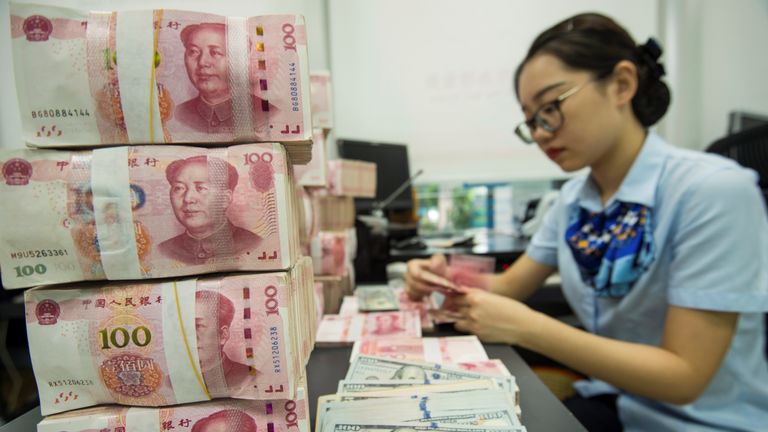It is somehow appropriate that, in the dying days of his administration, Donald Trump has wielded a weapon he threatened to brandish even before taking office.
The US Treasury has declared Switzerland and Vietnam to be "currency manipulators".
The term carries potential repercussions for both countries.
Under the Trade and Competitiveness Act, passed in 1988 when Ronald Reagan was in the White House, the US Treasury has to deliver a twice-yearly report to US Congress.
This requires it to analyse whether countries are manipulating the exchange rate between their currency and the US dollar, either to gain a trade advantage or to influence the balance of payments between the two.
The act did not specify sanctions against countries deemed to be currency manipulators and the designation was seen largely as symbolic.
That changed with the Trade Facilitation and Trade Enforcement Act, passed in 2015 when Barack Obama was president, which also finessed the definition of a currency manipulator.
It meant that, if a country designated a currency manipulator has not responded with policies to redress the balance of trade within a year, the president must block any projects in that country funded with US money.
The US government would also be barred from buying goods and services from that country.
Only one of these measures need be implemented - and can be overruled by a sitting president - but designating a country as a currency manipulator can therefore carry real world consequences.
Mr Trump, on being elected in 2016, promised to make the US Treasury declare China a currency manipulator on his first day in office.
He did not carry out that threat but, in August 2019, China was finally given the status for the first time in 15 years.
It lost the tag in January this year, following a deal with the US aimed at reducing trade imbalances, but remains on the "monitoring list" - a precursor to being dubbed a manipulator.
Also on the list are Japan, South Korea, Germany, Italy, Singapore and Malaysia.
Taiwan, Thailand and India joined it this week.
So what might the consequences be for Vietnam and Switzerland?
Well, perhaps for Vietnam, not so serious.
Its central bank, the State Bank of Vietnam, immediately promised to work with US authorities to ensure a "harmonious and fair" trade relationship.
"Vietnam's foreign exchange rate policy has for years been managed in a way to contain inflation, ensure macro stability and not to create unfair trade advantage," it added.
It is also possible Vietnam will benefit from the change of president.
The country has been in the Trump administration's sights for a while partly because a lot of Chinese manufacturers have been re-routing goods through the country to avoid US sanctions.
Robert Lighthizer, the outgoing US trade representative, believes Hanoi has at least turned a blind eye to this.
But his stance may not be matched by whoever Joe Biden appoints as his successor.
Switzerland, though, is not suing for peace.
For a start, it does not deny the Swiss National Bank's interventions in the foreign currency markets, which have caught traders on the hop on numerous occasions.
These include when, in September 2011, the SNB stunned markets by intervening to stop the Swiss franc from rising further against the euro.
Then, in 2015, it famously removed its currency peg against the euro in an episode dubbed by traders as the "Frankenschock".
The SNB sold £75bn worth of Swiss francs during the first six months of 2020 alone to try and stop the currency from overheating - which, at times of strife, it is inclined to do as investors seek a safe haven.
Nor does there appear to be much appetite among the Swiss for giving ground.
Thomas Jordan, the SNB chairman, told reporters today: "Just to be very clear.
"The US Treasury report has no impact on our monetary policy.
"Our monetary policy is necessary and legitimate, in fact it's the result of our mandate that we were given by the Swiss people and parliament to maintain price stability.
"It is very important that we maintain this price stability in order to avoid deflation in Switzerland."
Currency analysts do not expect the Swiss to suffer unduly from this stance.
Kamal Sharma, FX strategist at Bank of America Securities, told clients today: "With a new administration incoming from January, the SNB response has been to stonewall the labelling by the US Treasury…we do not expect the announcement by the US Treasury to have a material impact on the SNB reaction nor on the Swiss franc."
However, some believe there could be further consequences down the line, if the US can prove specific industries have been hurt by the SNB depressing the Swissie's value.
Steve Englander, head of Global G10 research at Standard Chartered, said: "Some members of Biden's Treasury transition team are seen as hawks when it comes to currency manipulation."
The irony in all this is that, arguably, Mr Trump is the biggest currency manipulator of all.
He has frequently attacked Jerome Powell, the Federal Reserve chairman, continually urging him to cut US interest rates and, by extension, bring down the value of the US dollar.
Moreover, he has triggered a series of damaging trade disputes, while frequently letting down some of America's staunchest allies - such as various NATO members, South Korea, Japan and the Kurds in Syria - with eccentric foreign policy decisions.
All of this has generally undermined respect for America and with it the US dollar's status as the world's global reserve currency.
That was what Mark Carney, the former Bank of England governor, was talking about when he spoke last year of "the destabilising influence of the dollar in the global monetary system".
And it may be why an increasing number of investors, no longer trusting the dollar after years of money printing by the US, are reaching for alternative stores of value such as cryptocurrencies such as bitcoin.









